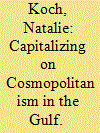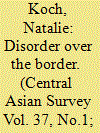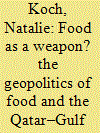|
|
|
Sort Order |
|
|
|
Items / Page
|
|
|
|
|
|
|
| Srl | Item |
| 1 |
ID:
169825


|
|
|
|
|
| Summary/Abstract |
“[N]ew forms of governance in the Gulf work through identity projects that include (and often co-opt) difference to gain legitimacy.” Third in a series on ways of governing.
|
|
|
|
|
|
|
|
|
|
|
|
|
|
|
|
| 2 |
ID:
159214


|
|
|
|
|
| Summary/Abstract |
Across Eurasia, authoritarian leaders have sought to justify their ‘strong-hand’ approach to government by framing instability as a security threat and the strong state as a guarantor of political stability. Such ‘regimes of certainty’ promote a modernist valorization of order, the flip side of which is a demonization of political disorder instability, or mere uncertainty. Examining the spatial and temporal imaginaries underpinning such narratives about in/stability in Central Asia, this paper compares official discourse in Kazakhstan and Uzbekistan, where state-controlled media and official publications have stigmatized political instability in Kyrgyzstan as indicative of the dangers of political liberalization and a weak state. Ostensibly about the ‘other’, these narratives are also about scripting the ‘self’. I argue that official interpretations of ‘disorder over the border’ in Kyrgyzstan are underpinned by a set of spatial and temporal imaginaries that do not merely reflect regional moral geographies, but actively construct them.
|
|
|
|
|
|
|
|
|
|
|
|
|
|
|
|
| 3 |
ID:
178187


|
|
|
|
|
| Summary/Abstract |
On 4 June 2017, Qatar was suddenly put under an embargo by its regional neighbors – an effort spearheaded by Saudi Arabia and the UAE, who cut off most of its existing land, sea, and air traffic routes. With no domestic agriculture to speak of, Qatar’s external logistics networks are essential for maintaining its food supply. The country’s 2.6 million residents, many of whom flooded the grocery stores, were understandably concerned about their ability to secure food when news about the embargo broke. Eventually, new food supply chains were established, primarily with the assistance of partners in Iran and Turkey. The ongoing rift between Qatar and its neighbors in the Arabian Peninsula, manifested only in part by this effort to undermine the country’s material supply networks raises a number of questions about an old idea: that of food as a ‘weapon’. This article puts this concept in historical and regional perspective in the Arabian Peninsula through the lens of critical geopolitics, tracing the securitizing discourses about food security and their intertwining with narratives about territorial sovereignty, nationalism, and essentialist understandings of geography to explain the causes and effects of the food embargo in the ongoing Qatar–Gulf rift.
|
|
|
|
|
|
|
|
|
|
|
|
|
|
|
|
| 4 |
ID:
177725


|
|
|
|
|
| Summary/Abstract |
This article examines recent renewable energy initiatives in two hydrocarbon rich states of Eurasia: Kazakhstan and Russia. The global nature of challenges surrounding energy and natural resource use demand that sustainability and “energy transition” policies be understood as geopolitical issues, which are increasingly (re)defining political relations among and within states. Existing research and media coverage of international energy politics in Eurasia is overwhelmingly dominated by a focus on oil and gas extraction, especially in Kazakhstan and Russia, due to their central place in traditional hydrocarbon fuels markets. As elsewhere in the world, however, political and economic leaders in both countries have started to adopt the language of promoting environmental sustainability, the “green economy,” and renewable energy infrastructures. Taking a critical geopolitics lens to recent developments, this article considers who is involved in advancing renewable energy in contexts that have traditionally been dependent on traditional energy sources, and what this may portend for the shifting energy landscape of Eurasia.
|
|
|
|
|
|
|
|
|
|
|
|
|
|
|
|
| 5 |
ID:
120724


|
|
|
|
|
| Publication |
2013.
|
| Summary/Abstract |
In a world still dominated by a geopolitical system of territorial states, one tool in the state- and nation-building repertoire is the strategy of moving a capital from one city to another, and to an ostensibly more 'central' location of a geometrically conceived territory. From Ankara to Brasília, the technique has been used in a variety of places around the world, and Kazakhstan's new capital since 1997, Astana, is one more recent iteration. Taking a Foucauldian approach to analysing political technologies of government, the author examines the strategy of the centrally located city and considers how it has been instrumental to simultaneously producing a 'state effect' and a 'territory effect' in newly independent Kazakhstan. Part of a larger mixed-methods study, this article draws on a diverse range of methods, including data from interviews, participant observation, textual analysis, focus groups and a country-wide survey.
|
|
|
|
|
|
|
|
|
|
|
|
|
|
|
|
|
|
|
|
|